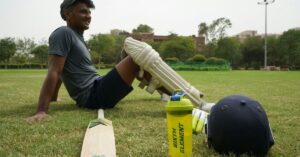How Mental Fitness Training Can Skyrocket Your Athletic Achievements

How Mental Fitness Training Can Skyrocket Your Athletic Achievements
When we think of athletic prowess, our minds often drift toward the physical aspects: the grueling hours spent in the gym, the countless drills on the field, or the impeccable nutrition plans. But what if I told you that the secret ingredient to unlocking an athlete’s true potential lies not just in the body, but in the mind? It sounds a bit cliché, doesn’t it? But there’s a growing body of evidence suggesting that mental fitness training could be the game-changer that many athletes are missing. And trust me, it’s not as fluffy as it sounds.
The Overlooked Power of the Mind
Let’s be honest, mental fitness doesn’t get nearly as much attention as it deserves. In a world where physical conditioning and technique reign supreme, the psychological aspects often take a backseat. I remember attending a sports seminar a few years back, where a well-respected coach mentioned that 90% of sports is mental. At first, I thought, “Sure, but what about the other 10%?” However, as I listened more, it struck me that the coach had a point—mental strength can dictate whether an athlete sinks or swims in high-pressure situations.
Take, for instance, the world of competitive swimming. Athletes like Michael Phelps have openly discussed the importance of visualization techniques. Phelps, who has racked up more Olympic medals than I can count on both hands, attributes part of his success to the mental exercises he practices. Imagine standing on that block, the pressure of thousands of eyes on you, feeling the weight of expectations. Now, add a pinch of self-doubt. It wouldn’t be easy, right? But with the right mental tactics, it becomes manageable—maybe even exhilarating.
What is Mental Fitness Training?
So, what exactly is mental fitness training? At its core, it involves techniques and practices designed to improve an athlete’s mental resilience, focus, and overall psychological well-being. It’s akin to a workout for your mind, where you consciously develop mental skills that can enhance performance.
Common components include:
- Visualization: Imagining successful performances to build confidence and reduce anxiety.
- Meditation: Practicing mindfulness to enhance focus and reduce stress.
- Self-talk: Using positive affirmations to combat negative thoughts.
- Goal-setting: Establishing clear, achievable goals to foster motivation.
Now, before you roll your eyes and think this is all fluff, consider that even elite athletes have been tapping into these methods for years. Imagine Novak Djokovic, who credits his success on the tennis court not just to his physical training, but also to his rigorous mental preparation. The guy even practices mindfulness techniques while on the court! If that doesn’t say something about mental fitness, I don’t know what does.
Building Mental Toughness
One of the primary goals of mental fitness training is to build mental toughness. It’s that elusive quality that allows some athletes to thrive in high-pressure situations while others crumble. Research suggests that mental toughness can be developed through consistent practice and application of mental fitness techniques.
But what exactly constitutes mental toughness? Here are some common traits:
- Resilience: The ability to bounce back from setbacks and failures.
- Focus: Maintaining concentration even in distracting environments.
- Confidence: Believing in one’s abilities and decisions.
- Positive mindset: Keeping a constructive approach even during tough times.
To illustrate, let’s chat about the infamous “Miracle on Ice” during the 1980 Winter Olympics. The U.S. hockey team, composed mostly of amateur players, faced off against the seasoned Soviet team, who were widely considered unbeatable. Yet, the U.S. team exhibited remarkable mental toughness, fueled by a belief in their strategy and each other. They didn’t just play; they believed they could win. And, as history shows, they did. Now, that’s what mental fitness can do!
The Science Behind Mental Fitness
While anecdotes and personal stories are compelling, the scientific community is catching up with the importance of mental fitness. Numerous studies have explored the connection between mental training and athletic performance.
For instance, a study published in the “Journal of Applied Sport Psychology” found that athletes who engaged in mental imagery reported higher confidence levels and improved performance outcomes. Another research piece from the “International Journal of Sports Science & Coaching” highlighted that mindfulness practices led to reduced anxiety and enhanced focus, resulting in better performance during competitions.
It’s important to emphasize that mental fitness is not a one-size-fits-all solution. What works for one athlete may not work for another. As I learned from speaking with various coaches, it’s about finding the right techniques that resonate with the individual. Some athletes thrive on visualization, while others might find solace in meditation. And then there are those who prefer to keep it simple with a good ol’ pep talk. (I mean, who hasn’t needed a little cheerleading now and then?)
Practical Tips for Implementing Mental Fitness Training
Ready to dive into mental fitness training but unsure where to start? No worries! Here are some practical tips to help you on your journey:
1. Start with Self-Awareness
Understanding your mental state is crucial. Take some time to reflect on your thoughts, feelings, and reactions during both training and competition. Keeping a journal can be an effective way to track your mental patterns and identify areas for improvement.
2. Set Clear Goals
Establishing specific, measurable, attainable, relevant, and time-bound (SMART) goals can provide direction. Whether you aim to improve your 5K time or recover from an injury, having clear objectives can focus your mental training efforts.
3. Incorporate Visualization Techniques
Spend a few minutes each day visualizing your goals and desired outcomes. Picture yourself executing a perfect performance, whether it’s sinking that three-pointer or crossing the finish line first. This mental rehearsal can bolster confidence, making success feel more achievable.
4. Practice Mindfulness
Engaging in mindfulness exercises can help you stay present and centered. Techniques such as deep breathing, meditation, or yoga can reduce anxiety and enhance focus, ultimately improving your performance in pressure-filled moments.
5. Use Positive Self-Talk
The way you talk to yourself matters—big time. Replace negative thoughts with empowering affirmations. Instead of “I can’t do this,” try “I am prepared, and I will do my best.” It may sound cheesy, but trust me, it works!
6. Seek Guidance
Consider working with a sports psychologist or mental coach. They can provide tailored strategies and support your mental fitness journey. Just like you would hire a trainer for physical conditioning, a mental coach can help you build your mental muscle.
The Role of Coaches and Support Systems
In my experience, having a solid support system can make a world of difference in mental fitness training. Coaches play a pivotal role in fostering an environment that prioritizes mental wellness. They can encourage athletes to embrace mental training alongside physical conditioning.
Take a page from the playbook of renowned coaches like Phil Jackson, who famously utilized mindfulness and meditation with the Chicago Bulls and Los Angeles Lakers. Jackson understood that the mind needed as much conditioning as the body. His approach not only led to championships but also fostered a culture of mental fitness among his players. So, if a coach can do it, why can’t you?
Real-Life Success Stories
When discussing mental fitness training, it’s worth highlighting some real-life success stories. These examples not only inspire but also demonstrate the tangible benefits of prioritizing mental health in sports.
Consider the story of Serena Williams, a tennis icon known for her fierce competitiveness and unparalleled achievements. Williams has openly discussed her battles with anxiety and the importance of mental fitness in her career. She practices visualization and has worked with sports psychologists to enhance her mental strength. Her ability to overcome adversity and maintain focus on the court is a testament to the power of mental training.
Another compelling example is the legendary golfer Tiger Woods. Woods has faced numerous challenges throughout his career, including injuries and personal struggles. Yet, he has continually returned to the top of the game, showcasing incredible mental resilience. His commitment to mental fitness practices, including visualization and positive self-talk, has contributed significantly to his comeback stories. (And let’s be honest, it’s easier to root for a comeback than a downfall, right?)
Overcoming Mental Barriers
As athletes, we all face mental barriers at some point—those pesky thoughts that tell us we’re not good enough or that failure is imminent. Overcoming these barriers is a crucial aspect of mental fitness training.
One effective method to tackle mental barriers is through exposure therapy. This approach involves gradually exposing yourself to situations that trigger anxiety or self-doubt. For example, if you struggle with performance anxiety during competitions, start by practicing in front of a small group of friends before working your way up to larger audiences. It’s like building a tolerance to stress—slow and steady wins the race!
Moreover, learn to reframe your thoughts. Instead of viewing setbacks as failures, consider them opportunities for growth. It’s all about shifting your mindset to see challenges as stepping stones rather than roadblocks. Remember, even the best athletes have encountered setbacks. What sets them apart is their ability to bounce back stronger.
The Future of Mental Fitness in Sports
As we look to the future, it’s clear that mental fitness training will only continue to grow in importance. With an increasing number of athletes recognizing the value of psychological well-being, it’s no longer an afterthought—it’s becoming a fundamental part of training regimens.
Institutions and sports organizations are beginning to incorporate mental fitness programs into their training protocols. From youth sports to professional leagues, there’s a push to prioritize mental health alongside physical development. Programs that integrate mental fitness training are not only yielding better athletes but also healthier individuals.
As the conversation surrounding mental health continues to evolve, we can expect to see even more resources dedicated to mental fitness training. Coaches, athletes, and organizations will increasingly prioritize mental health, recognizing its undeniable link to athletic performance.
Final Thoughts
In conclusion, mental fitness training has the potential to skyrocket athletic achievements in ways that traditional physical training cannot. By focusing on mental resilience, athletes can enhance their performance, overcome obstacles, and reach new heights. It’s about time we recognize the power of the mind in sports.
So, whether you’re a weekend warrior, competitive athlete, or just someone who enjoys a good workout, consider incorporating mental fitness training into your routine. Who knows? It might just be the edge you need to take your performance to the next level. And if you ever find yourself doubting your abilities, just remember the words of Michael Jordan: “I’ve missed more than 9,000 shots in my career. I’ve lost almost 300 games. Twenty-six times, I’ve been trusted to take the game-winning shot and missed. I’ve failed over and over and over again in my life. And that is why I’ve succeeded.” Now, isn’t that a comforting thought?






